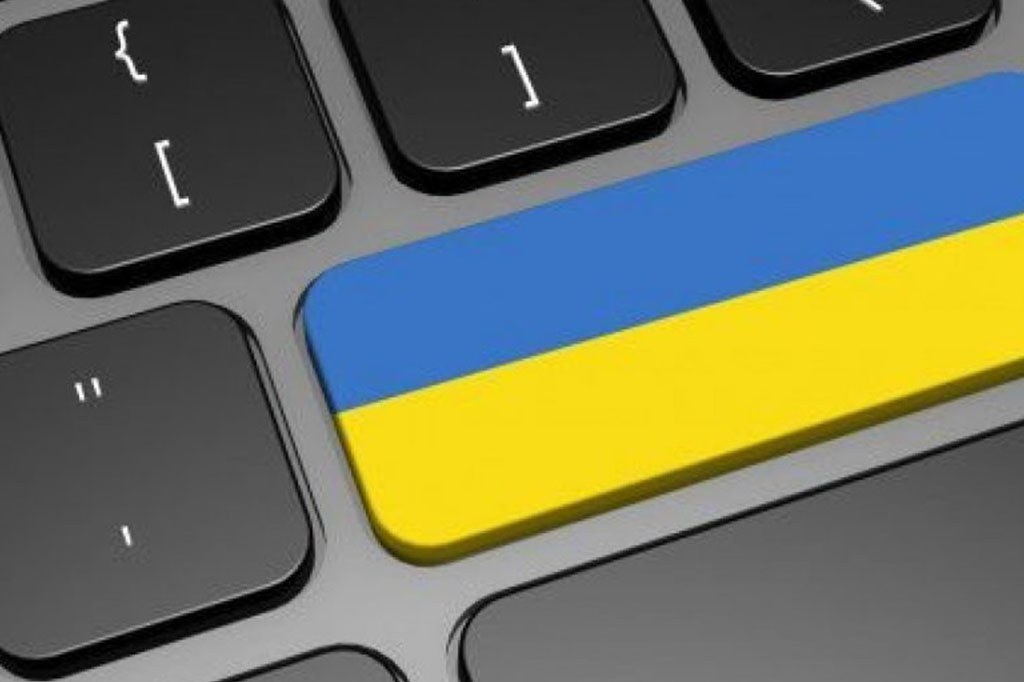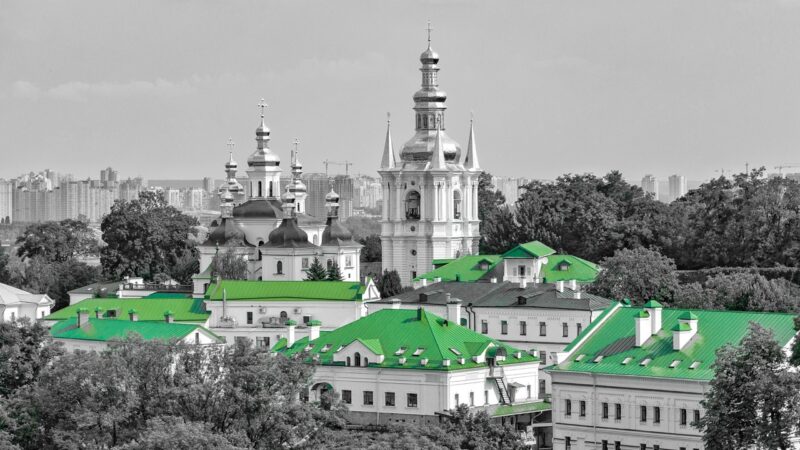Language as a cultural marker demands to be used

Taken in a larger context, it should really come as no great surprise that media producers in Ukraine have repeatedly complained that TV series actors are not good at expressing themselves in Ukrainian. For us, this is a very old problem.
Contrary to what you might believe, language is not like a mask you can don and instantly transform yourself. Indeed, such an effort at putting up a linguistic Potemkin façade would quickly be, er, unmasked. Even if you are a tremendous actor, the text you’ve memorized and are simply reciting will constantly call attention to your unsuitability for the role. Language, in fact, demands regular usage, and not just at the level of trivial everyday chatting—far from it. Above all, serious reading, discussion, and writing are required.
The argument usually resorted to by our media purveyors goes as follows: if a television series wants to sell, it would be best, wouldn’t it, to do it in Russian. This kind of thinking is perfectly natural for carriers of Russian culture. For a long time now we have witnessed them striving to shoehorn the linguistic diversity that is typical of a federative entity into a common base and then expand this imperial/Soviet/post-Soviet language standard outward. On the other hand, beyond the Russian sphere of influence the case does not arise, say, of Poles asking themselves whether it would be more lucrative to create Russian-language TV shows and sell them wherever this language is understood. It’s because the Poles have no problem with identifying language as a marker of their identity. So no one in the world ever confuses a Pole with a Russian, whereas for many people in the western parts of the former USSR—especially the Ukrainians—Russian language has long played havoc with their national identity.
Back in Soviet times, it was striking how extraordinarily similar to Russian the Ukrainian language appeared to be in movies. The Ukrainian-speaking characters were commonly portrayed as simpletons who were incapable of correct pronunciation. They were often people on the fringes, practically hicks—and also, for good measure, jealous, disloyal, greedy, and narrow-minded. The image was perpetuated of Ukrainians being shockingly tasteless and deliberately distorting their words to show how close their language was to Russian. In short, it was like you were dealing with some make-believe language because it sounded so clumsy, unrefined, and basically laughable compared to Russian—which, in contrast, was deemed suitable for quality products of high culture.
Apparently, it was Nikolai Gogol who succeeded in introducing this “Little Russian carnival tradition” into Russian literature by leavening his texts with innumerable Ukrainian words. His characters spoke them most amusingly, and this popularly accessible lowbrow genre gradually became the norm. Thus, the Soviet comedy duo Shtepsel & Tarapunka did not emerge out of thin air, and indeed they are an example of Ukraine’s “linguistic schizophrenia” policy that is still worthy of serious study today. The former talks in refined Russian about profound topics, while the latter guilelessly plays up to him with versified one-liners and stale jokes in simplified Ukrainian. Incidentally, to automatically accept the thinking that comedy takes a back seat to drama is erroneous, as creating in this genre also takes exceptional talent, particularly when irony or satire are involved. Nevertheless, in television comedy sometimes all it takes is the persona of a weakling ignoramus who is capable of nothing more than slapstick and toilet humour.
Beyond the entertainment industry, it seems that our stated problem is also to be found, lo and behold! in the halls of the Ukrainian government, where in-camera meetings of the cabinet discuss urgent matters in Russian, so that everyone will comprehend. Truly, why go through with the formalist “official state language” charade and all the extra bother and burden of learning if you are convinced that it’s only a second-rate dialect?[1]
As mentioned above, one might think that language constitutes a special interface that we use like an app. Namely, we should only need to make the necessary adjustments and then we’ll be able to use it easily and faultlessly, without any practice. However, language is decidedly not an app—it’s a kind of operating system that requires the integrated input of all of the stakeholders of a given culture. Wittgenstein asserted that the limits of our language are the limits of our world. But if today’s world overwhelmingly demands simplified data and analytics, then they аre usually presented to us in languages that sound like unrefined dialects or slang. That is the logic of it, for language is born in its usage. Therefore, we need to practice our living teaching, learning, and professional vocabulary and grammar every day, or else our language remains nothing more than a theatrical prop. And that is how it becomes disparaged as suitable only “in the kitchen,” while for expressing more substantive complexities there are “civilized languages.”
It is useless to maintain that one language is supposedly better and another totally inadequate. Neither is it appropriate to insist that some language must definitely be prohibited. But as experience has shown us, even deceptively moderate assertions that it makes no difference which language is spoken in Ukraine leave the door open and often lead to an outright refusal to speak Ukrainian. In this light, what has happened particularly since the long-awaited adoption of the official languages act in April 2019 is that the mere existence of Ukrainian in the public sector demonstrates that we should not be confused with our belligerent neighbour.
This issue, of course, goes far beyond what is covered in the media. When Ukraine’s public figures elect to speak in Russian—citing their wish to read a wider audience—what they are actually hiding is their unwillingness to do the work of increasing their terminology and capacity to articulate important ideas in Ukrainian. Namely, Heidegger’s thesis that language is the house of [the truth of] being does not refer to a cozy private house you build for yourself. If we Ukrainians want a common home for our nation, we all need to build it together. But if the word “Ukrainian” is only for show, why are we trying to fool ourselves and others?
Language starts not only with naming the things around you, like Adam gave names to all the animals and the birds. A key role in the historical development of language is also played by translation. That is why it is unquestionably important to read and speak many languages.
In the case of Ukrainian, however, let me point out that even the classical works of Marxism were translated not from the original German but from Russian(!). Evidently, this is what has engendered the belief that “why should we bother translating into Ukrainian when we have the Russian ones already? Ukrainian is adequate only for quotidian audial background, and the fact that we shall discuss existential, psychological, and professional issues in a foreign language we also happen to know is nothing to be concerned about; everyone understands it, after all.”
But Ukrainian culture, like any other, requires that the expression of vital and meaningful concepts be based on how our perceptions of the world and of human existence have been encoded and contemplated in our language. For example, only our language can provide an authentic explanation as to why freedom is such an important concept in our culture, rather than blind subordination to power, or authentic definitions of justice and heroism.
Ultimately, cultural-linguistic uniqueness also relates back to questions of human nature. Perhaps that is why various attempts throughout history to impose a common language on the nations of the world—even a custom-designed language such as Esperanto—have ended in failure. It seems, then, that language properly emerges from the environment of a given culture’s life-world, which simultaneously shapes its people and depends on their continuous engagement.
To be sure, all languages have
their limitations and cannot fulfill all the universal functions. Moreover, every language is capable of oppressive
influence. But ultimately, we cannot continue to exist as a sovereign culture
if we constantly translate or borrow our foundational concepts and viewpoints
from elsewhere. As we collect and categorizethe Ukrainian experience using our language as a framework, we may then
compare it to its counterparts in other languages, enriching our own
perceptions. For the linguistic structure itself can sometimes tease out threads
of identity that the language of a different culture would not be able to do. Finally, in this profound new/renewed relationship
as a nation with our native language, Ukrainians shall gain the perspective that
will allow us to discern not only what we have in common with other cultures
but also what makes us totally unique.
[1] In 1863 the Imperial Russian minister of internal affairs, Petr Valuev, banned all publications in Ukrainian, including translations of the Bible, infamously declaring that “no separate Little Russian language has ever existed, it does not exist, nor can it ever exist, and the dialect used by the common folk is the very same Russian language, only contaminated by Polish influence” (encyclopediaofukraine.com).
https://ukr.lb.ua/culture/2020/02/10/449512_mova_potrebuie_vzhitku.html
Taras Lyuty, philosopher
Translated, with added references, by Ksenia Maryniak,
CIUS/ASAUS.
[1] In 1863 the Imperial Russian minister of internal affairs, Petr Valuev, banned all publications in Ukrainian, including translations of the Bible, infamously declaring that “no separate Little Russian language has ever existed, it does not exist, nor can it ever exist, and the dialect used by the common folk is the very same Russian language, only contaminated by Polish influence” (encyclopediaofukraine.com).





